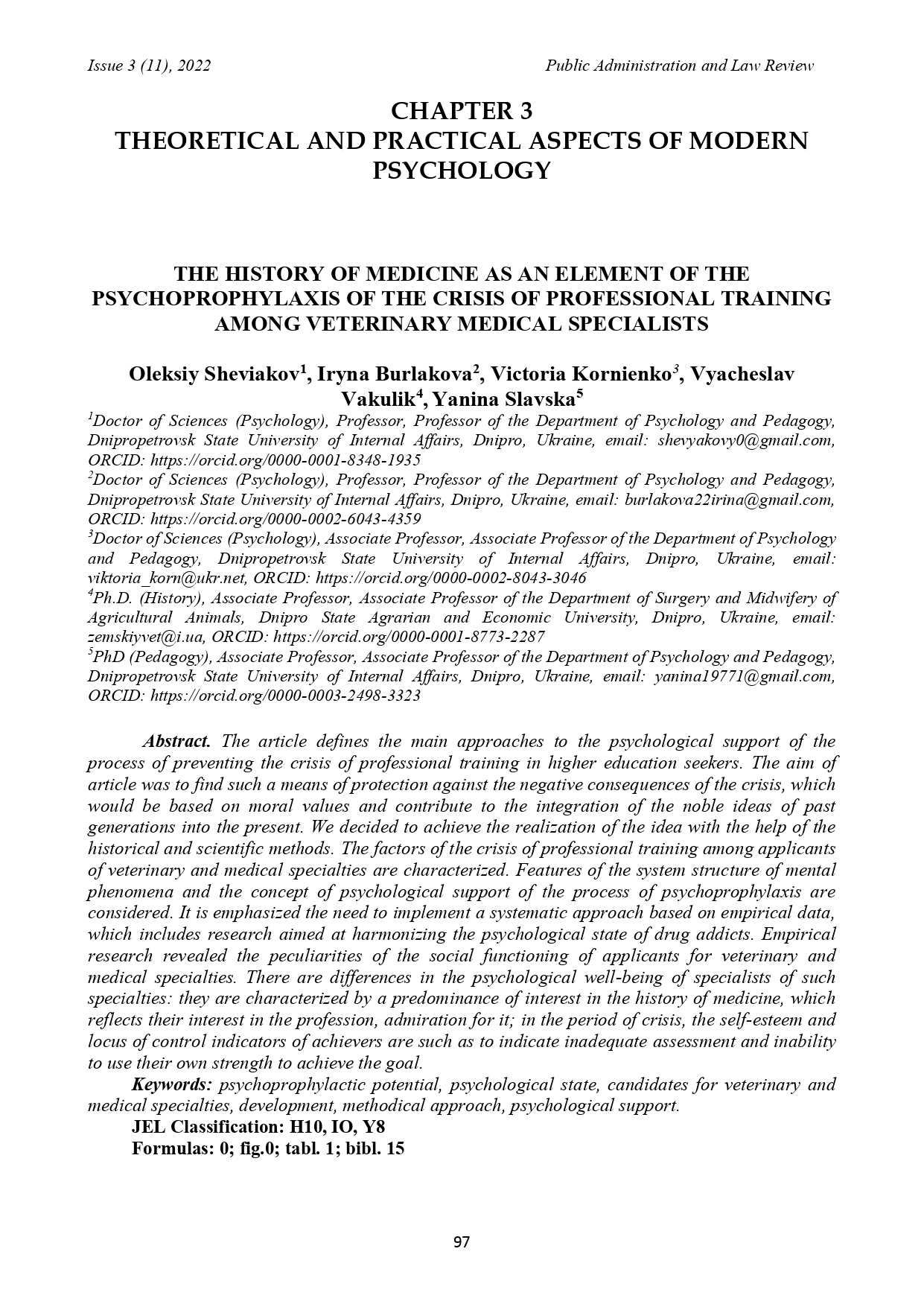THE HISTORY OF MEDICINE AS AN ELEMENT OF THE PSYCHOPROPHYLAXIS OF THE CRISIS OF PROFESSIONAL TRAINING AMONG VETERINARY MEDICAL SPECIALISTS
DOI:
https://doi.org/10.36690/2674-5216-2022-3-97Keywords:
psychoprophylactic potential, psychological state, candidates for veterinary and medical specialties, development, methodical approach, psychological supportAbstract
The article defines the main approaches to the psychological support of the process of preventing the crisis of professional training in higher education seekers. The aim of article was to find such a means of protection against the negative consequences of the crisis, which would be based on moral values and contribute to the integration of the noble ideas of past generations into the present. We decided to achieve the realization of the idea with the help of the historical and scientific methods. The factors of the crisis of professional training among applicants of veterinary and medical specialties are characterized. Features of the system structure of mental phenomena and the concept of psychological support of the process of psychoprophylaxis are considered. It is emphasized the need to implement a systematic approach based on empirical data, which includes research aimed at harmonizing the psychological state of drug addicts. Empirical research revealed the peculiarities of the social functioning of applicants for veterinary and medical specialties. There are differences in the psychological well-being of specialists of such specialties: they are characterized by a predominance of interest in the history of medicine, which reflects their interest in the profession, admiration for it; in the period of crisis, the self-esteem and locus of control indicators of achievers are such as to indicate inadequate assessment and inability to use their own strength to achieve the goal.
Downloads
References
Arshava, І.F. (2019). Age aspect of psychological rehabilitation potential of patients with depressive disorders and its influence on the process of rehabilitation. Science and education a new dimension. Series : Pedagogy and Psychology. Vol. VII (77), Issue: 188. Budapest: Society for Cultural and Scientific Progress in Central and Eastern Europe, pp. 77 – 79.
Bengel, J. (2018). Education, advanced and further training in the field psychology in rehabilitation. Rehabilitation (Stuttg). Vol. 53(2), pp. 124 – 130.
Bennabi D. (2015). Risk factors for treatment resistance in unipolar depression. A systematic review. J. Affect. Disord. Vol. 171, pp. 137 – 141.
Bohlmeijer, E. (2011). Efficacy of an early intervention based on acceptance and commitment therapy for adults with depressive symptomatology: Evaluation in a randomized controlled trial. Behav Res Ther. Vol. 49(1), pp. 62 – 67.
Burlakova, I, Sheviakov, O. (2021). Psychologycal predictors of the formation of health-preserving competentmess of future specialists. Public administration and Law Review. 4(8), pp. 74-79.
Caza, A. (2010). Psychological capital and authentic leadership. Asia-Pacific Journal of Business Administration. Vol. 2, №.1, pp. 53 – 70.
Christian, A. (2011) Coping style as a mediator of the relationship between depressive symptoms and deliberate self-harm. Crisis. Vol. 32, № 5, pp. 272 – 279.
Chung, J. (2018). Relationships among resilience, self-esteem, and depressive symptoms in Chinese adolescents. J. Health Psychol. Vol. 19, pp. 13 – 59.
Constand, M.K. (2014). Scoping review of patient-centered care approaches in healthcare. BMC Health Serv Res. Vol. 14, pp. 271–272.
Coventry, P. (2015). Integrated primary care for patients with mental and physical multimorbidity: cluster randomised controlled trial of collaborative care for patients with depression comorbid with diabetes or cardiovascular disease. BMJ. Vol. 350, pp. 637–638.
Culbertson, S. (2010). Feeling good and doing great: The relationship between psychological capital and well-being. Journal of Occupational Health Psychology. Vol.15. № 4, pp. 421 – 433.
Dyshkant O., Dichek N., Beschastnyy V., Savishenko V., Hurskyi V. (2021). Pedagogycal and Psychological Settings for Training of Student Lawyers in Framed Professional Communication. Journal of Educational and Social Research. Vol 11. №3. 2021. pp.77-87.
Sheviakov O., Burlakova I., Kornienko V. (2022). Psychological provision of processes modernization of metallurgical production management. Academic Notes to the University “KROK”. №2(66). pp.192-293.
Burlakova, I., Sheviakov, O., & Kondes, T. (2021). Psychological predictors of the formation of health-preserving competentness of future specialists. Public Administration and Law Review, (4), 74–79. https://doi.org/10.36690/2674-5216-2021-4-74.
Burlakova, I., & Sheviakov, O. (2021). Socio-psychological technologies of professional health formation. Public Administration and Law Review, (3), 54–64. https://doi.org/10.36690/2674-5216-2021-3-54.

Downloads
Published
How to Cite
Issue
Section
License
Copyright (c) 2022 Oleksii Sheviakov, Iryna Burlakova, Victoria Kornienko, Vyacheslav Vakulik, Yanina Slavska

This work is licensed under a Creative Commons Attribution 4.0 International License.





